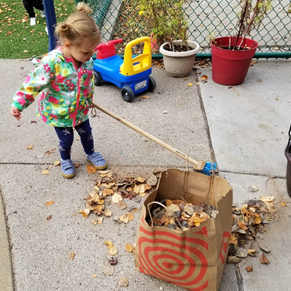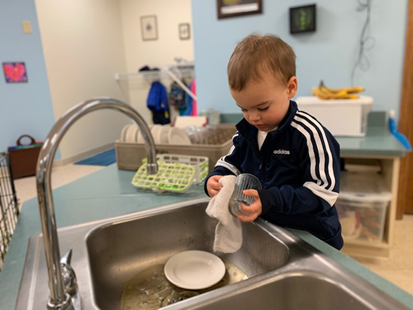A Fresh Look at Chores
You already know that chores are good for children. You remember dreading them when you were a child, you may have tried to implement them at home, and may have experienced varying levels of success. You have probably come across those incredibly helpful charts that list what is appropriate for children at different ages.
You may have even experienced life being unpredictable and throwing things off course, with your previously established chore routine left completely forgotten.
Consider this article a reminder about the amazing benefits chores can have for children and their families. These five tips may even give a little fresh perspective.
1. Consider what is developmentally appropriate
There are many resources online that list what is an appropriate chore for each age. Here is a great one , even if your child is older and you want to revisit this information. Keep in mind that every child is different, but this is a good general guide. The idea is not to make your child do everything they are capable of every single day, but it serves as a helpful guide in knowing what is possible. Lists like these are a good starting point in developing your own routine at home.
It can be amazing to consider what our children are capable of, but we do want to balance that knowledge with not giving them tasks that are beyond their abilities. If we push independence in a specific area too soon, we are likely to cause frustration and a sense of failure. Focusing on the age-appropriate tasks will bring success, build feelings of confidence, and set the stage for more challenging tasks in the future.
2. Build a routine
Children thrive on routine. When they know what to expect, everything runs more smoothly. It gives them a sense of safety and predictability, and it makes things so much easier for everyone. Once an expectation is set, there is rarely a need for nagging.
Routine looks different for every family, and it is important to find what works for you. Some ideas in case you are looking for inspiration:
● Use visual lists as nonverbal reminders. This might be a simple sticky note for older kids, or a picture list for kids who are not reading yet.
● Be super consistent in the beginning. Putting in the work at first is not always easy, but it pays off in the long run.
● Start when your child is young. Children are not as excited to help when they get older, so establishing routines early is helpful.
● Allow for time to complete the tasks, considering that it takes children longer to complete them - especially when they are first learning.
3. Follow their lead
Younger children - meaning up through at least the lower elementary years - actually do want to do chores. The key is to pay attention and notice what they are into. Some want to do laundry while others love sweeping and mopping. It really does not matter what they are doing to help; the key is to find ways to integrate children into our regular household tasks. We all have chores we prefer over others, and children are no different. While it is true, we all must do tasks we do not enjoy sometimes, there is nothing wrong with basing your chore system on the tasks your child does like to do.
Many children just want to be by your side. This makes things simple. If you are cooking dinner, give them a cucumber to chop. Doing laundry? Hand them a pile of washcloths to fold (even toddlers can help with that!). Vacuuming the car? Make it their job to clean out the back seat area first.
4. It is okay to help them out
As much as we push for cultivating independence, we cannot expect our kids to do everything all the time. It can be easy to forget that. It is their responsibility to clear the table after dinner, but you know they have had a tough day. It is okay to jump in and do it for them. We need to remember that building good habits and skills is important, but so is modeling what we do for the people we love.
During the elementary years children seem to lose all sense of order and leave a trail of mess in their wake everywhere they go. When you have called them back to pick up for the 27th time in the day and you are frankly tired of it, it is okay to just take care of that empty milk carton they have left on the counter. You have made your point, and they will not even remember they ever left it there in the first place. They really are doing their best, and it is fine to help them along the way.
5. Frame chores as a contribution
The chores we give our children should not be a punishment. They should not even be a set of mundane, hard-to-tolerate tasks enforced upon them. Chores are a way to contribute to the family and school community. We can teach our children about everything that needs to happen to allow a household to run smoothly, and then we make sure they understand that it should not all fall on the adults.
Our children want to be a part of what we do. They want to help. It feels good to really be a contributing member of the family.
Below is a quote from Dr. Maria Montessori you may find inspiring:
"Therefore this work which has built up civilization and which has transformed the earth is at the very basis of life and is a fundamental part of it. So much so, that it is, as we say, even in the child. Work has existed in the nature of man as an instinct even from birth itself.... The study of society will be held to be a study of the life of the child which shows us in an embryonic stage this profound tendency of humanity and the mechanism by which society is built up." (Dr. Maria Montessori, 'Child’s Instinct to Work', AMI Communications, 1973, 4, 9)




